I am deeply committed to working with marginalized communities to address environmental challenges through inclusive, community-based approaches. My work focuses on natural resource management, particularly water resource sustainability, and aims to restore dignity and agency to communities that are often overlooked in mainstream environmental planning. At the heart of my approach is co-design—engaging directly with local residents to develop tailored, culturally relevant solutions that reflect their lived experiences and priorities. I work across various townships and rural areas, facilitating participatory planning processes that enable communities to understand their natural environments, contribute their ideas, and take ownership of sustainability efforts. Whether it’s through climate adaptation planning in Limpopo, water reuse projects in KwaZulu-Natal, or awareness campaigns using theatre and visual storytelling in townships in Johannesburg, my goal is always the same: to ensure that people feel seen, heard, and empowered. In addition to project implementation, I am dedicated to research that creates real-world impact. I mentor postgraduate students, encouraging them to design studies that not only fulfil academic requirements but also bring about meaningful change. In my own community I also lead skills development and mindset transformation programmes, particularly for youth and women of colour, using STEM education to inspire confidence, curiosity, and hope in communities where opportunity is often limited. By combining scientific knowledge, creative communication, and community engagement, I strive to challenge the one-size-fits-all approach to environmental planning. I advocate for locally driven solutions that respond to the unique social, cultural, and ecological contexts of each community. Ultimately, my work seeks to bridge the gap between science and society, creating pathways for sustainable development that are inclusive, just, and deeply rooted in the communities they aim to serve.

Finalist
Science Communication Award Award
Co-Creating Solutions: Community-Driven Science Communication for Water Resilience
Finalist Science Communication Award Award
University of Johannesburg - South Africa
""Empowering communities to protect, manage, and sustain local water resources." "
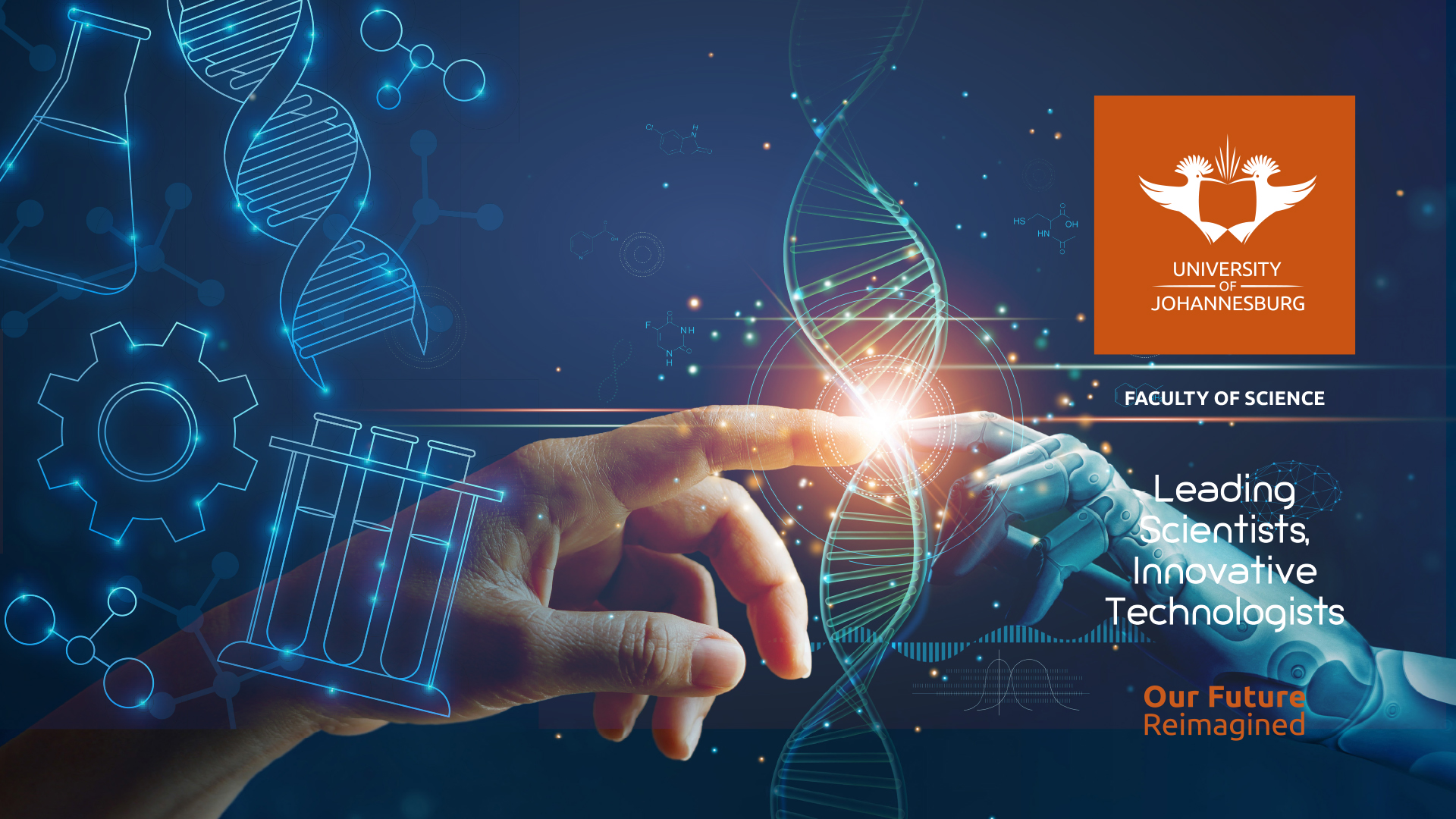
Have a say and vote for this entry to win the People's Choice Award!
500 points per vote
Provide your email address and click on "vote". You will then receive an email that enables you to verify your vote by clicking on a link.
1500 points for each share/re-post; 500 points for each like
This entry has not provided any social media links for community voting.
Summary
Key People

Prof Terrence Ambala
Associate Professor
Multi-media department,
University of Johannesburg
Acknowledgements
First and foremost, I give thanks to my Heavenly Father for the strength, guidance, and opportunities that have allowed me to walk this unconventional research journey. All the glory belongs to Him.
To my incredible husband and two sons—thank you for your unwavering support and the many sacrifices you’ve made along the way. Traveling across the country to pursue my passion often meant time away from you, yet you never wavered in your encouragement. Your belief in me has been one of my greatest sources of strength.
To my immediate family, thank you for standing by me through this journey. Your love and support have been a constant anchor.
I extend sincere gratitude to my University and its leadership for fostering an environment where emerging researchers are encouraged to grow, innovate, and lead. To the funders—particularly the University of Johannesburg and the National Research Foundation—thank you for making so much of this work possible.
Most importantly, to every community and community member who welcomed me into your space: thank you for your trust, time, and participation. You have brought meaning and depth to every project, and it is your stories and contributions that make this work truly impactful.
Finally, I dedicate this work to my late father. May his legacy of uplifting others and making a positive impact in the lives of those around him continue to live on through the work I do.
Images
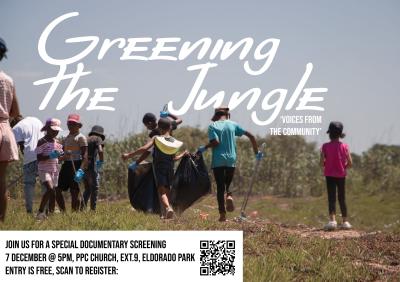
Documentary screening in the township of Eldorado Park
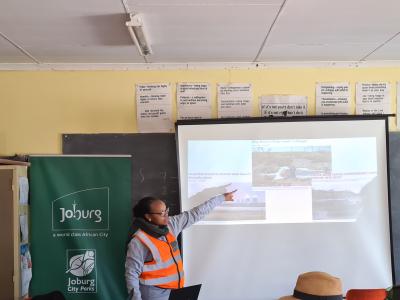
Using mine-craft in community participatory planning. The "Block by Block" initiative by UN-Habitat uses Minecraft to involve diverse groups, including youth, women, and slum dwellers, in the process of designing public spaces.
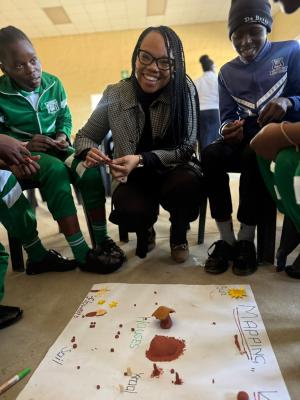
Participatory mapping with youth in a rural village in Kwa Zulu natal
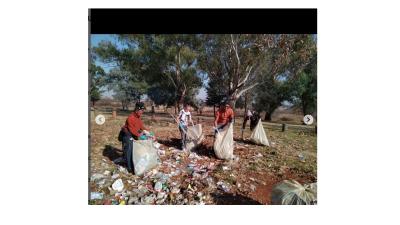
Community clean ups to restore a degraded public urban green park
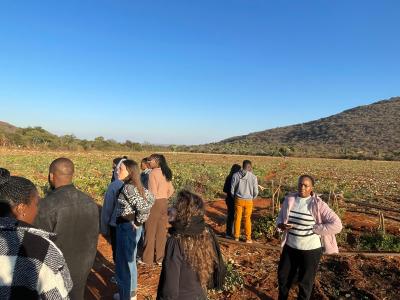
Community based participatory planning for climate adaptation in a rural village in Limpopo
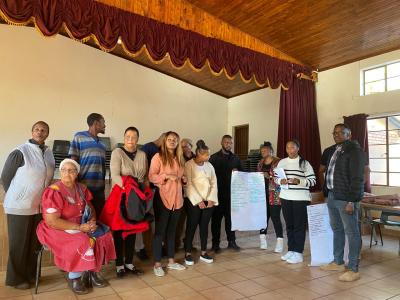
Community co-creating and co designing climate adaptation and mitigation plans for water and food security
IMPACT STORY
Impacting lifes
My favourite impact story takes place in Buysdorp, Limpopo in South Africa. In this rural village a powerful transformation began with a simple conversation. The community, long excluded from formal environmental planning, shared their growing concerns about water scarcity and climate unpredictability. Instead of arriving with ready-made solutions, I facilitated a community-led dialogue, asking residents what climate adaptation looked like to them. The elderly spoke of past practices, the youth shared ideas for green spaces and energy saving technologies, and local leaders highlighted urgent needs.
Together, we co-developed a climate adaptation plan rooted in local knowledge and lived experience. With funding secured, we were able to start implementing parts of the plan—improving water access, creating awareness on climate resilient food gardens, and strengthening food security. Importantly, the project caught the attention of local government and NGOs, who began providing further support for the community’s resilience efforts.
To honour the community's voice and preserve its legacy, we are also documenting the entire process on film. In doing so, we are giving the elders an opportunity to capture and share their indigenous knowledge on camera—ensuring that their wisdom, stories, and traditional environmental practices are preserved for future generations. This step has deepened community pride and highlighted the value of knowledge systems often overlooked in mainstream science.
What made this experience so impactful was not just the outcomes—it was the shift in mindset and ownership. Buysdorp is now a model for community-driven environmental leadership, reminding us that when people are truly heard, they not only engage—they lead the way toward sustainable change.
LEARNINGS
Lessons learnedMy advice to aspiring young scientists and researchers is this: do the work that matters, even when it’s not always visible or rewarded in traditional ways. Community-focused research is one of the most meaningful paths you can take—not because of the money or the number of papers you publish, but because you are privileged to use your knowledge and skills to make a real difference in people’s lives. Never underestimate the power of giving a voice to communities that have been historically silenced due to social or financial exclusion. There is deep value in listening, learning, and co-creating solutions with those who are often left out of mainstream science and policy conversations.
FUTURE PLANS
What's coming?
Looking ahead, the focus of my work is on scaling and sustaining the community-based environmental projects we’ve co-designed across various marginalized areas in South Africa. These initiatives—ranging from climate adaptation planning and water resource management to skills development and youth mentorship—have already shown that inclusive, locally-driven solutions can have real impact when rooted in respect and collaboration.
To ensure these projects don’t end as pilots, I am now actively applying for large international grants that will support the full implementation and long-term sustainability of the work. These funding efforts aim to strengthen infrastructure, expand community training, support the integration of indigenous knowledge systems, and enable more robust monitoring and evaluation frameworks.
One of the key goals is to formalize community hubs for environmental action, where local stakeholders can continue engaging in participatory planning, knowledge sharing, and implementation beyond the life of the project. These hubs will also provide platforms for youth education, women's leadership, and intergenerational learning, anchored in both scientific and traditional ecological knowledge.
Additionally, I aim to scale the documentation process, capturing not just outcomes but the stories, voices, and wisdom of community elders and young changemakers. By doing so, I am hoping to influence policy and practice, demonstrating that environmental justice and sustainability are most effective when driven from the ground up.
My vision is clear: to create models of community-led sustainability that are adaptable, inclusive, and replicable—both locally and across the African continent.

